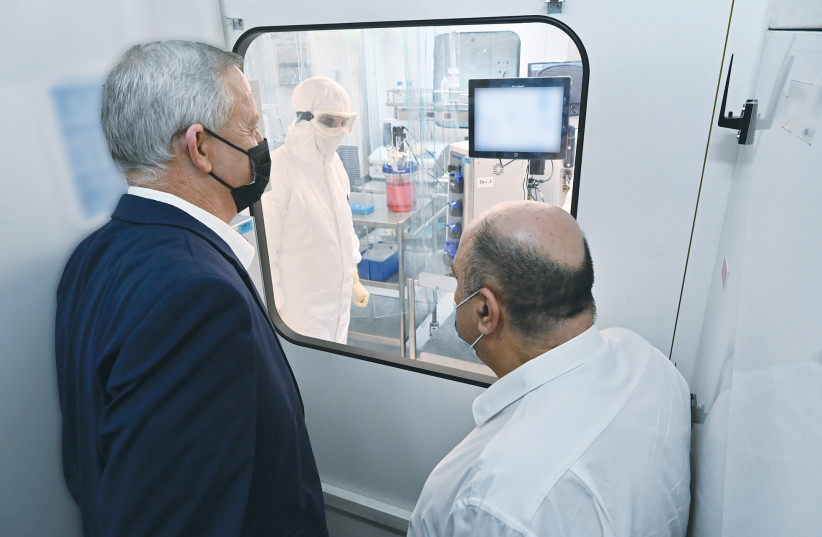When in the spring of 2020 countries around the world were vying for supplies of Pfizer-BioNTech vaccine to protect their populations against COVID-19, the director of the secretive Ness Ziona Biological Institute – anesthesiologist and former Hadassah University Medical Center administrator Prof. Shmuel Shapira – pressed Prime Minister Benjamin Netanyahu to let his and his staff develop an alternate vaccine “quickly.” Shapira saw it as a chance to improve the facility’s standing as it faced budget cuts, boosting his own prestige in the process.
Eager to show that Israel could do better than foreign vaccine companies and unaware of or unwilling to investigate the institute’s capabilities, Netanyahu agreed and called “BriLife” a national mission, allocating a budget of approximately NIS 230 million on the project. The prime minister called for immediate and rapid R&D processes to develop a vaccine.
“If we work fast enough and with the proper budgeting and with the talented people we have, here too Israel will be ahead of the world.”
Benjamin Netanyahu
“If we work fast enough and with the proper budgeting and with the talented people we have, here too Israel will be ahead of the world,” Netanyahu said.
The Health Ministry is the authorized regulatory to approve the conduct of the clinical trial on humans, the manufacturing process under GMP conditions and the use of the vaccine doses.
In December of last year, after Shapira resigned, his successor Shmuel Yitzhaki announced that the Ness Ziona vaccine had “not succeeded.” It had been tested only on lab rodents. Yitzhaki said that that the Israeli vaccine wasn’t based on mRNA technology that was the basis of the widely praised Pfizer and then the Moderna vaccines but on a different model that American drug giant Merck was promoting. After a few months of research in 2020, Merck realized the scope of the challenge and halted its project the following January. Instead, it teamed up with Johnson & Johnson to produce its own vaccine.

Critics said Shapira was certain that with a modest budget, 80 of his people could succeed where Merck – a company with tens of thousands of employees and 2021 revenues topping $48 billion – could produce an effective vaccine. After it failed, Shapira blamed “bureaucratic reasons” and maintained that the Pfizer and Moderna vaccines were not as successful as claimed.
What did Israel's state comptroller say?
The state comptroller, in his investigation of the Ness Ziona disaster, writes that the BriLife project was closed without the development and production of the vaccines and antibodies having been completed and without them being approved for use in humans. He states that an audit revealed back in 2018 that its facilities are outdated and did not meet Good Manufacturing Practice (GMP) conditions.
The heavily guarded institute, which operates within an orange grove south of Tel Aviv under the aegis of the Defense Ministry, began even before the founding of the State of Israel. The institute has three research areas – biology, chemistry and environment. Its designation includes R&D and examination of biological and chemical defense issues Development, establishment and maintenance of infrastructures in these subjects, including in the field of detection and identification management and operation of central laboratories in the biological and chemical field and R&D activity in his fields of activity.
The comptroller wrote that in January 2021, a GMP certificate was issued for the institute for three years, but the process of preparing the vaccine production line for necessary conditions was fraught with difficulties. The facility was “inappropriate,” there was no continuous production and a lack of manpower skills. An audit was required to grant approval of phase-3 vaccine production, but it did not take place.
“It emerged that the condition of the production facility at the institute and its non-compliance with the current rules were known before the outbreak of the pandemic, but Shapira decided to produce the vaccine nevertheless.
“In February 2020, the new coronavirus began to spread outside the borders of China to the entire world. In view of this, and against the background of the fear of serious danger to public health, the State of Israel began preparing to deal with the epidemic. In this context, Prime Minister Netanyahu instructed the Biological Institute to promote immediate and rapid R&D processes in order to develop a vaccine and antibody treatment against COVID-19,” the comptroller wrote.
“Crisis management,” he concluded, “especially unexpected crises, requires decision-making and quick execution of actions under conditions of stress and uncertainty. At the same time, the urgency that existed at the beginning of the epidemic cannot be a justification for the deficiencies that existed during the period after February 2020, when the development task was imposed on the institute.”
